Even when he sometimes touches upon subjects that are even “controversial” (i.e. do not conform to general ideas) for people within the manosphere, he often makes good points and either creates laughter or encourages reflection. While his novels mainly take place in France, many of the discourses can be contextualized so that an American can draw the same conclusions with regard to his native country.
In this article I will describe and explain some of the core ideas that Houellebecq has written about in Whatever, The Elementary Particles (2000), Platform (2002), The Possibility of an Island (2005), The Map and the Territory (2012), and Submission (2015). I have also read some of his material in French, such as Lanzarote (2000), but focus solely on the English translations of the novels. Secondarily I will also make value judgments about the overall quality of each novel.
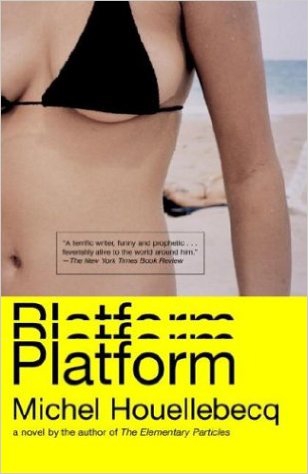 The sexual marketplace
The sexual marketplace
As ROK writer Troy Francis emphasizes in his terrific article, Houellebecq was one of the first thinkers to analyze the sexual marketplace. This angle was mainly used in Whatever, in which the unnamed protagonist and his ugly virgin co-worker Raphael face the reality of contemporary Western social-liberal culture.
The semi-depressed and cynical protagonist has had sex, although it was about two years ago since the last time, and is thus not a total lost case, but prefers to jerk off rather than to compete for the meat while in a nightclub. His friend, on the other hand, is simply too ugly to bang and even considers to kill a more sexually successful black guy in resentment. It is misanthropic and not very uplifting, although the reality for some people.
“Economic liberalism is an extension of the domain of the struggle, its extension to all ages and all classes of society. Sexual liberalism is likewise an extension of the domain of the struggle, its extension to all ages and all classes of society.”
Whatever is not as well-written and multi-faceted as Houellebecq’s later works, but quite entertaining and makes good points about for instance the significance of material wealth vis-a-vis emotional well-being.
Cloning and aging
The Elementary Particles and The Possibility of an Island focus on futuristic scenarios, cloning in particular. But whereas the former only has genetic programming as a frame, the plot in The Possibility of an Island alternately is about Daniel and his two clones, living as hermits in post-apocalyptic environments.
The real Daniel is an aging yet still successful comedian who manages to bang young hotties up to a point where even he becomes too old for his girlfriend. His hedonistic lifestyle can be looked upon as empty, but at least he is not miserable until he gets cuckolded. It is quite depressing to read about this process but also very realistic.
The controversy, especially spelled out at the end of The Elementary Particles, is that Houellebecq suggests that a world without men would be better and safer. I would leave it up to the readers to reflect on that.
Apart from this dimension, though, it is brimming with real-talk and sharp observations:
“The terrible predicament of a beautiful girl is that only an experienced womanizer, someone cynical and without scruple, feels up to the challenge. More often than not, she will lose her virginity to some filthy lowlife in what proves to be the first step in an irrevocable decline.”
Overall The Elementary Particles is better and perhaps his strongest novel up to this date. It features all of the main strengths of Houllebecq’s particular writing formula, such as dark humour, sharp political and philosophical commentary, social analysis and human relationships (both regarding love and lust).
Sex tourism and hedonism
In Platform, Houellebecq deals with hedonism in parallel with sex tourism in more depth. The protagonist is a 40-year old sex tourist, who, together with his much younger and hotter French girlfriend Valérie, starts to reflect upon the ideal modern world: a place in which less prosperous people, not only Thai (although a large share of the plot occurs in Thailand), can serve the needs of the global middle and upper classes. Only aggressive traditional religions/ideologies like Islam can stand in its way.
About 17 years later we know that this type of world has not been realized, although in part it is still the case that men go to places like Pattaya to have sex with prostitutes. In fact, Matrix-like phenomena such as virtual reality and human-like sex dolls and robots appear to be where things are heading.
Platform is still an entertaining and engaging novel. Some of the characters, Robert in particular, remind one about ROK contributors and commentators.
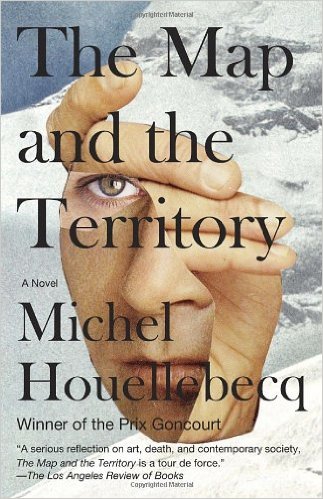 Islamization and traditional resurgence
Islamization and traditional resurgence
The conservative and traditional angle can fragmentarily be found within Houellebecq’s earliest works, but in The Map and the Territory one finds a more distinctive penchant for pre-modern ideas such as Ferdinand Tönnies’ Gemeinschaft (community preferred over society). For French people, a quiet life on the countryside might be preferable to the urban landscape.
There is also a connection between this and his succeeding book Submission, since the French traditionalist philosopher René Guénon is briefly mentioned in The Map and the Territory. In Submission his writings play a more explicit role in the realm of ideas.
Overall, though, the Islamization of France, is the core idea that Submission hinges upon. It is full of interesting observations:
Hidden all day in impenetrable black burkas, rich Saudi women transformed themselves by night into birds of paradise with their corsets, their see-through bras, their G-strings with multicolored lace and rhinestones. They were exactly the opposite of Western women, who spent their days dressed up and looking sexy to maintain their social status, then collapsed in exhaustion once they got home, abandoning all hope of seduction in favor of clothes that were loose and shapeless.
Style-wise The Map and the Territory might be Houellebecq’s strongest novel, which granted him the Goncourt prize, but idea-wise Submission is more worthwhile.
In summary
Even if many of these ideas have been covered by ROK over the years, and sometimes in more depth, Houellebecq is a great novelist and his books are worth reading only for the sake of pleasure (or for the sake of ideas). It can also be a way to red pill blue pill readers since he, despite the controversy that his books has led to, is a well regarded and award winning author. Strongly recommended.
Read More: Why Michel Houellebecq’s “Submission” Is The Most Important Novel Of 2015
Why Michel Houellebecq’s “Submission” Is The Most Important Novel Of 2015
In the horrific aftermath of the recent atrocities at the offices of Charlie Hebdo, the news –unbeknown to all but the magazine’s sixty-thousand subscribers – that Michel Houellebecq was on the cover of the current issue quickly spread around the world.
To those who have followed Houellebecq’s writing career (he is France’s foremost contemporary novelist by some distance) this was hardly a surprise. After all, Houellebecq is a man who once described Islam as “the stupidest religion” in an interview and was sued by a civil rights group for hate speech (he won on grounds of freedom of speech) and whose book Platform contains the following lines:
Every time I heard that a Palestinian terrorist, or a Palestinian child or a pregnant Palestinian woman, had been gunned down in the Gaza Strip, I felt a quiver of enthusiasm at the thought of one less Muslim.
Nevertheless, there was perhaps some slight surprise that the old provocateur had done it again. Now aged 56, Houellebecq had finally seemed to mellow with his last book The Map and the Territory, which won the Prix Goncourt in 2010, France’s top literary award. Houellebecq, it seemed, had at last been admitted into the fold of respectability.
But then given that his new novel Soumission (Submission in English) imagines a France in the near future led by a Muslim president and subject to Sharia Law, such surprise was misplaced.
Houellebecq and Charlie Hebdo
There was some speculation at the time that the Houellebecq cover had proved an irritant sufficient to motivate the Paris killings. Of course, this proved to be unfounded – after all, the Kouachi brothers had planned their attack for some time, and wouldn’t have known the subject matter of upcoming issues.
Although publication of the book in France wasn’t cancelled, as some thought it might be, nevertheless Houellebecq cancelled all promotion for it and went underground. His friend Bernard Maris, economist and Charlie Hebdo contributor, had been among those killed. When he resurfaced some days later, shaken, his first words were “Je Suis Charlie.”
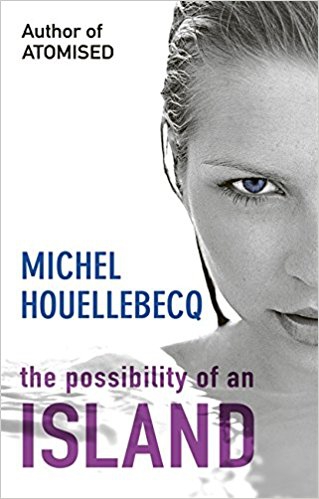 Reading Houellebecq’s past comments and hearing Submission’s synopsis it would be forgivable to assume that he is a rabid Islamophobe whose thinking lacks all subtlety—an ignorant rabble-rouser. But nothing could be further from the truth. Here’s Adam Gopnik of the New Yorker in a recent article on his work:
Reading Houellebecq’s past comments and hearing Submission’s synopsis it would be forgivable to assume that he is a rabid Islamophobe whose thinking lacks all subtlety—an ignorant rabble-rouser. But nothing could be further from the truth. Here’s Adam Gopnik of the New Yorker in a recent article on his work:
The other striking thing about Houellebecq is how literary he is—the first hundred or so pages of “Submission” depend on a complicated analysis of the work of the nineteenth-century writer J. K. Huysmans, best known as a novelist of Decadence and the Church, and for his influence on other French writers. This is, at least, an inadvertent compliment to the continued literary culture of France: no American satiric novelist, not Tom Wolfe or Christopher Buckley, could hope to hold a mass audience with hundreds of pages on the follies typically encountered in the university study of Hart Crane, or on how best to conceptualize his relationship with Wallace Stevens.
In fact, Houellebecq is a literary artist of the highest order – he is a satirist in the grand tradition of Orwell and Huxley, taking current social trends and extrapolating them, then looking with horror at what we have become, and what we could become in the near future.
Sexual Marketplace
Heartiste recently tweeted that while Houellebecq is currently having his historical “moment,” what he should really be remembered for is his analysis of the sexual marketplace. This is from his first novel “Whatever”:
It’s a fact, I mused to myself, that in societies like ours sex truly represents a second system of differentiation, completely independent of money; and as a system of differentiation it functions just as mercilessly. The effects of these two systems are, furthermore, strictly equivalent. Just like unrestrained economic liberalism, and for similar reasons, sexual liberalism produces phenomena of absolute pauperization. Some men make love every day; others five or six times in their life, or never. Some make love with dozens of women, others with none. It’s what’s known as ” the law of the market”. In an economic system where unfair dismissal is prohibited, every person more or less manages to find their place. In a sexual system where adultery is prohibited, every person more or less manages to find their bed mate. In a totally liberal economic system certain people accumulate considerable fortunes; others stagnate in unemployment and misery. In a totally liberal sexual system certain people have a varied and exciting erotic life; others are reduced to masturbation and solitude…………
Love as a kind of innocence and as a capacity for illusion, as an aptitude for epitomizing the whole of the other sex in a single loved being rarely resists a year of sexual immorality, and never two. In reality the successive sexual experiences accumulated during adolescence undermine and rapidly destroy all possibility of projection of an emotional and romantic sort; progressively, and in fact extremely quickly, one becomes as capable of love as an old slag.
Houellebecq, who began his creative life as a poet, is behind the humour a deeply sad writer whose work accurately pinpoints the deep inadequacies in contemporary society. He also neatly skewers the concerns of the manosphere in elegant but devastating aphorisms such as the following, from The Possibility of an Island:
Show men endless images of beautiful models and actresses and singers, show them endless images of beautiful, slim, women engaging in sex with enthusiasm, tell them that a world of uncommitted and marriageless sex is the norm — then, for reasons they don’t understand, slam the door in their face.This is not a prescription for long term stability.
Houellebecq looking well, yesterday.
The charge laid against Submission is of course that it is Islamophobic. But is it? An English translation won’t be available until late summer, but early indications suggest that it is not. Gopnik again:
The spectre of an Islamic re-reconquest is therefore mixed with admiration for its discipline and purpose. The Muslim warriors are taken to be antimaterialists inspired by an austere ideal—the very idea of submission to authority that we have lost. In the back-and-forth of fantasies of conquest and submission between panicked Catholics and renascent Muslims, Islam plays an ambiguous role, as both the feared besieger and the admirable Other.
The novel, set in 2022, concerns a middle-aged protagonist called Francois, an academic who is obsessed equally with the work of J.K. Huysmans and sex with young co-eds. When a deal between the left and a popular Muslim party is brokered to prevent the far right from coming to power, the coalition wins the election.
They agree that the socialists will look after finance and foreign affairs, while the Muslims will handle education and social issue. This leads quickly to the introduction of Sharia Law: women are required to wear modest clothes in public, schools are segregated by gender, with girls taught cooking and trained to be wives and mothers, very limited opportunities for higher education. Regular prayer and study of the Koran are also implemented. Polygamy becomes the norm. Left with little choice by the new state, Francois converts to Islam.
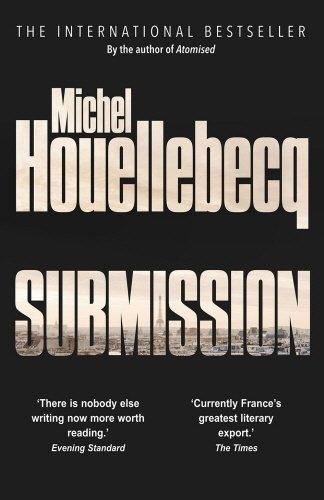 Islamophobic
Islamophobic
Where many were expecting an excoriating, dystopian account of life under the harsh new regime, it would appear that in fact society stabilizes and things get better in France. With feminism reigned in, traditional values re-established and polygamy encouraged, Francois, it would appear, rather enjoys the new state of affairs.
Far from being Islamophobic, the implication of the novel seems to be that debased western society with its deeply-flawed sexual marketplace would actually be improved by aspects of the faith’s prescripts. It is clear from an interview that Houellebecq recently gave to the Paris Review that his attitudes to Islam have shifted in recent times:
The Koran turns out to be much better than I thought, now that I’ve reread it—or rather, read it. The most obvious conclusion is that the jihadists are bad Muslims. Obviously, as with all religious texts, there is room for interpretation, but an honest reading will conclude that a holy war of aggression is not generally sanctioned, prayer alone is valid. So you might say I’ve changed my opinion. That’s why I don’t feel that I’m writing out of fear [of assimilation into Islam]. I feel, rather, that we can make arrangements. The feminists will not be able to, if we’re being completely honest. But I and lots of other people will.
But this is not a book that will please everyone:
We haven’t spoken much about women. Once again you will attract criticism on that front.
Certainly a feminist is not likely to love this book. But I can’t do anything about that.
The English edition is slated for release in September — without a doubt it will be the most significant fiction release of 2015, both for its commentary on Islam and feminism. I for one can’t wait.
To find out how to operate efficiently in the sexual marketplace and meet beautiful women click here
 The sexual marketplace
The sexual marketplace Islamization and traditional resurgence
Islamization and traditional resurgence


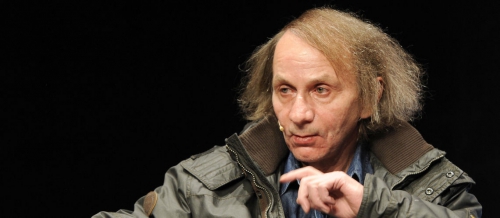
 Reading Houellebecq’s past comments and hearing Submission’s synopsis it would be forgivable to assume that he is a rabid Islamophobe whose thinking lacks all subtlety—an ignorant rabble-rouser. But nothing could be further from the truth. Here’s Adam Gopnik of the
Reading Houellebecq’s past comments and hearing Submission’s synopsis it would be forgivable to assume that he is a rabid Islamophobe whose thinking lacks all subtlety—an ignorant rabble-rouser. But nothing could be further from the truth. Here’s Adam Gopnik of the  Islamophobic
Islamophobic
 del.icio.us
del.icio.us
 Digg
Digg
Les commentaires sont fermés.